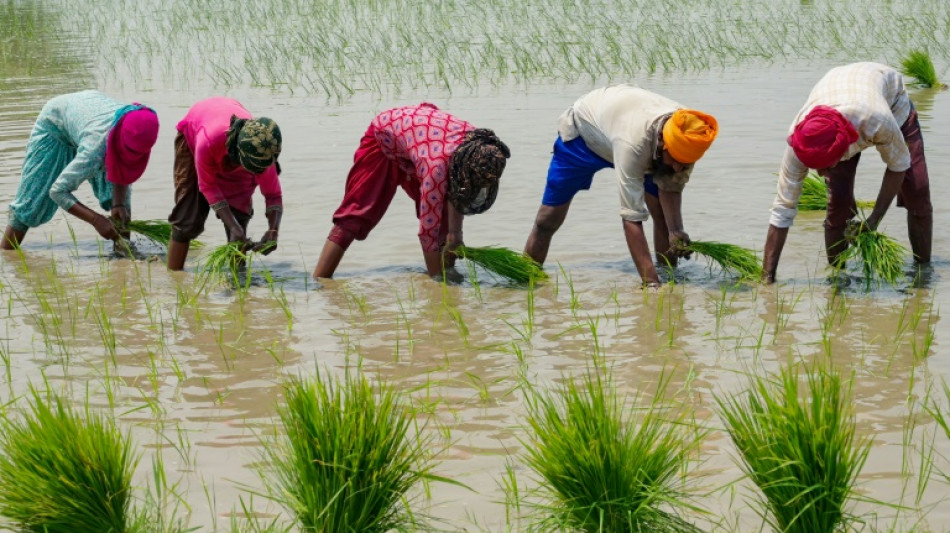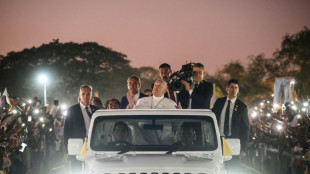
-
 Latin America fondly farewells its first pontiff
Latin America fondly farewells its first pontiff
-
'I wanted it to work': Ukrainians disappointed by Easter truce

-
 Harvard sues Trump over US federal funding cuts
Harvard sues Trump over US federal funding cuts
-
'One isn't born a saint': School nuns remember Pope Francis as a boy

-
 Battling Forest see off Spurs to boost Champions League hopes
Battling Forest see off Spurs to boost Champions League hopes
-
'I don't miss tennis' says Nadal

-
 Biles 'not so sure' about competing at Los Angeles Olympics
Biles 'not so sure' about competing at Los Angeles Olympics
-
Gang-ravaged Haiti nearing 'point of no return', UN warns

-
 US assets slump again as Trump sharpens attack on Fed chief
US assets slump again as Trump sharpens attack on Fed chief
-
Forest see off Spurs to boost Champions League hopes

-
 Trump says Pope Francis 'loved the world,' will attend funeral
Trump says Pope Francis 'loved the world,' will attend funeral
-
Oscar voters required to view all films before casting ballots

-
 Bucks' Lillard upgraded to 'questionable' for game 2 v Pacers
Bucks' Lillard upgraded to 'questionable' for game 2 v Pacers
-
Duplantis and Biles win Laureus World Sports Awards

-
 US urges curb of Google's search dominance as AI looms
US urges curb of Google's search dominance as AI looms
-
The Pope with 'two left feet' who loved the 'beautiful game'

-
 With Pope Francis death, Trump loses top moral critic
With Pope Francis death, Trump loses top moral critic
-
Mourning Americans contrast Trump approach to late Pope Francis

-
 Leeds and Burnley promoted to Premier League
Leeds and Burnley promoted to Premier League
-
Racist gunman jailed for life over US supermarket massacre

-
 Trump backs Pentagon chief despite new Signal chat scandal
Trump backs Pentagon chief despite new Signal chat scandal
-
Macron vows to step up reconstruction in cyclone-hit Mayotte

-
 Gill, Sudharsan help toppers Gujarat boss Kolkata in IPL
Gill, Sudharsan help toppers Gujarat boss Kolkata in IPL
-
Messi, San Lorenzo bid farewell to football fan Pope Francis

-
 Leeds on brink of Premier League promotion after smashing Stoke
Leeds on brink of Premier League promotion after smashing Stoke
-
In Lourdes, Catholic pilgrims mourn the 'pope of the poor'

-
 Korir wins men's Boston Marathon, Lokedi upstages Obiri
Korir wins men's Boston Marathon, Lokedi upstages Obiri
-
China's CATL launches new EV sodium battery

-
 Korir wins Boston Marathon, Lokedi upstages Obiri
Korir wins Boston Marathon, Lokedi upstages Obiri
-
Francis, a pope for the internet age

-
 Iraq's top Shiite cleric says Pope Francis sought peace
Iraq's top Shiite cleric says Pope Francis sought peace
-
Mourners flock to world's churches to grieve Pope Francis

-
 Trump says Pope Francis 'loved the world'
Trump says Pope Francis 'loved the world'
-
Sri Lanka recalls Pope Francis' compassion on Easter bombing anniversary

-
 Pope Francis inspired IOC president Bach to create refugee team
Pope Francis inspired IOC president Bach to create refugee team
-
Alexander-Arnold will be remembered for 'good things' at Liverpool: Van Dijk

-
 US VP Vance meets Indian PM Modi for tough talks on trade
US VP Vance meets Indian PM Modi for tough talks on trade
-
Pentagon chief dismisses reports he shared military info with wife

-
 15 potential successors to Pope Francis
15 potential successors to Pope Francis
-
The papabili - 15 potential successors to Pope Francis

-
 Zhao sets up all-China clash after beating 2024 world snooker finalist Jones
Zhao sets up all-China clash after beating 2024 world snooker finalist Jones
-
Ostapenko stuns Sabalenka to win Stuttgart title

-
 Argentina mourns loss of papal son
Argentina mourns loss of papal son
-
African leaders praise Pope Francis's 'legacy of compassion'

-
 Mehidy's five wickets help Bangladesh fight back in first Zimbabwe Test
Mehidy's five wickets help Bangladesh fight back in first Zimbabwe Test
-
'The voice of god': Filipinos wrestle with death of Pope Francis

-
 Prayers, disbelief in East Timor after Pope Francis death
Prayers, disbelief in East Timor after Pope Francis death
-
Real Madrid hold minute's silence as La Liga mourns Pope Francis

-
 World leaders pay tribute to Pope Francis, dead at 88
World leaders pay tribute to Pope Francis, dead at 88
-
World leaders react to the death of Pope Francis


Rice price spike offers preview of climate food disruption
A 15-year high in rice prices, prompted by top exporter India's restrictions on overseas sales, should be a wake-up call on how climate change can disrupt food supplies, experts say.
Rice prices jumped 9.8 percent in August, bucking decreases in other staples, the Food and Agriculture Organization said last week.
That followed the July decision by India, which accounts for 40 percent of global rice exports, to ban the overseas sale of non-basmati rice.
The government cited soaring domestic prices for the staple, caused by geopolitics, the El Nino weather pattern and "extreme climatic conditions."
This year is expected to be the hottest in human history, and the impacts of the seasonal El Nino weather pattern could make conditions even harsher.
Despite severe flooding in parts of northern India, this August was the country's hottest and driest on record.
The monsoon season that brings up to 80 percent of the country's annual rain has been far below normal levels.
India's July restrictions followed a decision last September to ban exports of another variety of rice that is a staple in parts of Africa.
Up to eight percent of global rice exports for 2023/24 could now be taken out of the market, according to analysis by BMI, Fitch Group's research arm.
- Drought fears -
For now, the crisis offers an opportunity for India's rivals, including number two and three exporters, Thailand and Vietnam.
Both have increased exports this year, with Nguyen Nhu Cuong, an official with Vietnam's agriculture and rural development ministry, touting a "bumper crop" and plans to increase planting.
But the dry conditions that tend to accompany El Nino mean smooth sailing ahead is unlikely, warned Elyssa Kaur Ludher, from the ISEAS-Yusof Ishak Institute's Climate Change in Southeast Asia programme.
"My question is whether they can continue to do this once El Nino comes into force towards the end of this year, when water becomes more scarce," she told AFP.
"I think the end of this year and especially the beginning of next year will be very, very tough," she added.
A naturally occurring weather phenomenon, El Nino typically lasts nine to 12 months and is expected to strengthen late this year.
Even before India's latest restrictions, its effects were boosting rice export prices, according to BMI.
And in Thailand, national rainfall levels are currently 18 percent lower than expected for the time of year, the Office of National Water Resources said this month.
Late rains could still make up the difference, but the agency said it is "concerned about a drought caused by El Nino."
- 'New normal' -
The consequence is one of price rather than supply, said Charles Hart, agricultural commodities analyst at Fitch Solutions.
"This is not a running out of rice moment," he stressed, noting India's restrictions have not been followed by other exporters.
Instead, the situation is likely to force the drawdown of stocks rebuilt after pandemic-era depletions, and prompt importers to seek new deals and impose local limits.
Top importer the Philippines this month signed a deal with Vietnam to help stabilise supply, days after announcing a national price cap.
For some though, unaffordable prices amount to the same as a lack of supply: less food.
"It's not just a food availability issue, but it's also a social stability issue, it's a political issue," said Ludher.
The current disruptions should be a wake-up call for policy-makers, she added, with more attention needed to the plight of farmers across various sectors.
Climate change can affect productivity, with lower crop yields as temperatures rise, but also increases the likelihood of extreme events like the 2022 Pakistan floods.
"Global grain export markets are relatively concentrated, so that kind of extreme weather risk accumulates in a few markets," Hart added.
In India, policymakers need to develop better early-warning systems and new planting patterns, said Avantika Goswami, a climate change researcher at the Centre for Science and Environment.
"Erratic weather patterns are the new normal," she told AFP.
"Now, it's a case of early adaptation. In the long-term, global emissions have to come down."
burs-sah/ssy
S.Gantenbein--VB




